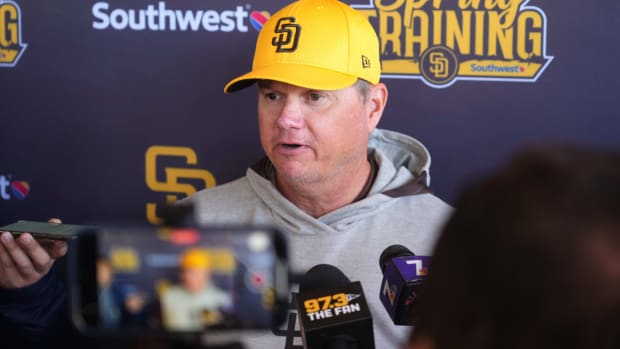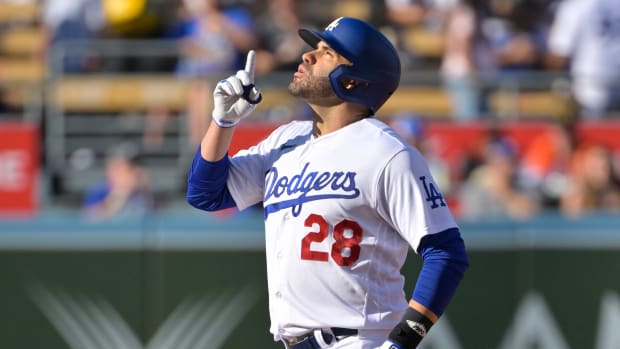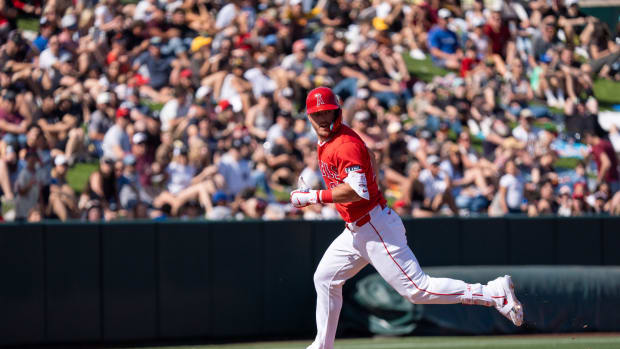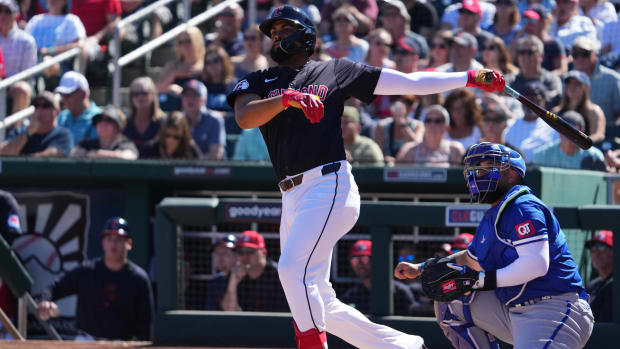Rodriguez reaches 400 career saves, but Rivera's record is untouchable
On Tuesday night, Francisco Rodriguez recorded the 400th save of his career in the Tigers’ 3–1 win over the Phillies. In doing so, he became just the sixth man in major league history to reach that milestone, joining Billy Wagner (422), John Franco (424), Lee Smith (478), Trevor Hoffman (601) and, of course, Mariano Rivera (652). As impressive as that might be, none of those men has been elected to the Hall of Fame despite all but Rivera having appeared on the Baseball Writers’ Association of America ballot (Rivera will be eligible in 2019). Rodriguez’s milestone thus serves as a reminder of the lack of a meaningful benchmark for career saves totals, as well as just how unbreakable Rivera’s record—still 252 saves away for the 34-year-old Rodriguez—appears to be.
Like wins, saves are a flawed statistic, but career totals still carry some significance as a marker of sustained quality rather than as a precise measure of excellence. Indeed, career save totals haven’t been completely ignored by Hall of Fame voters. Hoffman was named on 67.3% of the ballots in his first year of eligibility and seems sure to be inducted in the next few years, if not necessarily on the next ballot. Rivera is widely regarded as an automatic first-ballot selection. Of the five pitchers inducted into the Hall of Fame primarily on the strength of their relief pitching, four—Dennis Eckersley (390), Rollie Fingers (341), Goose Gossage (310) and Bruce Sutter (300)—reached what had previously been considered the benchmark total of 300 career saves. The lone exception, knuckleballer Hoyt Wilhelm, played the majority of his career before the saves statistic became official in 1969, and his career total of 228 stood as the record until Fingers became the first pitcher to reach 300 in 1980. Since Smith became the first pitcher to record 400 saves in 1993, however, 300 has been reached 22 more times, with pitchers as undistinguished as Todd Jones, Jose Mesa, Francisco Cordero and Jason Isringhausen joining the club.
As for those with 400 saves, Smith (once the career record holder) has appeared on as many as 50.6% of the BBWAA ballots, but he received just 34.1% of the vote this past year, his penultimate year of eligibility, and appears likely to fall off the ballot without being elected next year. Franco was a one-and-done candidate, receiving just 4.6% of the vote in his lone year on the ballot. Wagner, meanwhile, was arguably a better pitcher than Hoffman, but he received just 10.5% of the vote in his first year of eligibility. The message appears to be that, if there is a Hall of Fame benchmark for career saves, it may be as high as 600—twice the previous standard.
Astros done? Plus, more on Fielder, Harvey, bad potential rule change
How likely is Rodriguez to reach that mark? He now leads the American League with 14 saves this season, putting him on pace to save 50, adding 36 to his career total. At 436 saves at year's end, Rodriguez would be heading into his age-35 season still 164 saves shy of 600. To get there, he would need to average 27 1/3 saves through his age-40 season. That’s not beyond the realm of possibility. From his first year as the Angels’ full-time closer in 2005 through his last full season in '15, Rodriguez averaged 34 saves despite serving primarily as a setup man in two of those years. If Rodriguez were to save even 45 games this year, he would have averaged 42 1/3 saves per season since returning to the role in 2014.
The catch is that we’re talking about a pitcher entering his late 30s. There have been numerous closers who have thrived in that stage of their careers. Rodriguez, however, is a pitcher in his 14th full season who has already had to reinvent himself once, going from the classic closer model of a wild, fastball/slider flamethrower to a changeup specialist with improved control but unremarkable velocity. With that velocity continuing to decline—his average fastball this year has been below 90 mph—it’s an open question as to how long Rodriguez can continue to succeed in his new guise. Thus far, his strikeout rate is down below league average, and his walk rate, which had fallen in each of the last three seasons, has spiked back up over three per nine innings. Rodriguez walked just 11 batters in 57 innings last season; this year, in just 17 2/3 innings, he has already walked six (one intentional in both cases).
Josh Hamilton's future in doubt, but expect Rangers to give him a chance
Let’s say Rodriguez saves 45 games this year, then sheds five saves a year through his age-40 season. That would put him just shy of 600 for his career at 596. Of course, saves are entirely dependent on opportunity. Having already been removed from the closer role once in his career, Rodriguez is more likely to see his save opportunities vanish all at once than to experience a steady decline. Baring a complete collapse by Rodriguez, the Tigers are likely to pick up his $6 million option for 2017 and keep him in the closer role for at least that one more season, but will they or any other team want to sign a 36-year-old with a high-80s fastball to be their closer for 2018? The more you factor in the reality of his age and likely opportunities, the more difficult reaching that 600-saves benchmark would seem to be for Rodriguez. Rivera’s career mark, meanwhile, lies another 52 saves beyond that, and seems safely out of reach.
As for who else might make a run at Rivera’s total: There are three other active pitchers with 300 or more career saves, though calling 41-year-old Joe Nathan “active” is a bit of a stretch. Nathan, who has 377 career saves, did sign a major league deal with the Cubs last week, but he is coming off his second Tommy John surgery, is not expected to pitch until July and is unlikely to earn many save opportunities if and when he does return.
Next on the list at 361 saves is Jonathan Papelbon, who is more than a year older than Rodriguez. Papelbon is in the final year of his contract and similarly unlikely to find teams eager to employ him as a closer in his age-36 season or beyond given his declines in velocity and strikeout rate in recent seasons, to make no mention of his disagreeable personality.
The last man in that group is 32-year-old Huston Street, at 320 saves. Street is roughly a year and a half younger than Rodriguez but is currently on the disabled list with an oblique strain, preventing him from adding to his career total. Street has recorded double-digit saves in all 11 of his major league seasons prior to this one, but he could double his career total and still fall a dozen saves shy of Rivera.
As for the closers still in their twenties, Craig Kimbrel has a big lead on that group with 237 saves. The Red Sox' closer will turn 28 on Saturday and is currently second in the AL in saves to Rodriguez with 12, putting him on pace for 43 this season, a total in line with his average of 45 saves per year over the last five seasons. If Kimbrel can keep up that pace until he is Rodriguez’s age (that is, through his age-34 season), he’ll add 303 saves to his current total for 540. He would then still need 112 to catch Rivera, which would be doable, though I’m not convinced that averaging 45 saves over a dozen years is terribly feasible.
Still, Kimbrel has a shot. If he can avoid injury, maintain his effectiveness and continue to hold down a closing job for at least another decade (averaging at least 40 saves per season into his late 30s), Kimbrel is the one active pitcher with at least two full major league seasons under his belt who would appear to have even a chance of reaching Rivera’s total. That is to say that Rivera’s record is safe for now, despite Rodriguez’s ongoing charge up the career saves list.
As for Rodriguez’s Hall of Fame chances: While he does have the single-season saves record (62 in 2008) and his memorable contributions to the Angels’ championship run in '02 to his credit, the poor reception for Wagner on his first year on the ballot as well as Rodriguez own off-field issues serve as strong indicators that his chances of reaching the Hall are about as good as his odds of reaching Rivera.


































